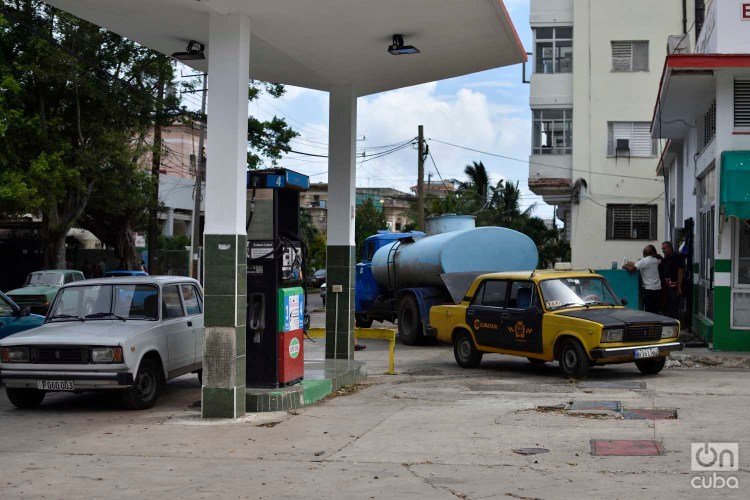Cuba is once again experiencing fuel shortage problems that have caused long lines at gas stations throughout the country, while Cubans are also struggling these days to get toiletries and other basic products such as detergent and toilet paper.
The supply of diesel and gasoline has had moments of instability since last September the authorities denounced that the new U.S. sanctions were hindering the arrival of oil ships to the island, but the crisis has worsened since the end of last week.
For now, and unlike what happened at the end of last year, the Cuban executive has not issued any statement to explain if new measures or restrictions will be adopted, although the managers of some gas stations are explaining to customers that they only have a limited amount of daily fuel to sell to private individuals who pay in cash.
Once that amount runs out, private individuals must wait until the next day because the rest of the supply is reserved for state vehicles and other entities that have prepaid cards.
The WhatsApp of solidarity
Since the problems began, groups have multiplied in mobile applications such as WhatsApp or Telegram in which users share information about where there is fuel, how long the line is or where a tanker will arrive soon to supply the gas station.
According to the information circulating in these groups, the shortage has especially affected the eastern part of the country and, in particular, Santiago de Cuba, the island’s second most important city.
“I had a full tank, today it ran out, I’m almost empty, I’m forced to make the line rain or shine. If I don’t fill the tank, I can’t work, unfortunately it’s like that,” said a taxi driver who was waiting at a gas station in Havana on Monday.
Félix, at the same station, had been waiting for three hours to fill his vehicle’s tank while affirming that things “are bad, really really bad.”
In September 2019, Cuban President Miguel Díaz-Canel announced that the country was facing a complicated “temporary” energy situation because it had temporarily stopped receiving oil due to U.S. pressures on shipping companies to prevent the arrival of fuel to Cuba in retaliation for its support to Venezuela, its main supplier.
This situation particularly affected diesel fuel and faced by that circumstance the island’s government established a series of “adjustment and saving measures” that had a major impact on public transportation services.
In addition to the fuel saving measures in state transportation, others were added in the public sector like the reduction of the diesel assigned to agencies and enterprises, and the schedules for using air conditioning in government dependencies.
A month later, Díaz-Canel considered the most critical phase of the fuel supply crisis was over and said that the island could already cover 62% of its requirements, although he said that there would still be “tensions” in some sectors.
In recent months, Washington has applied new sanctions that have had a severe impact on the Cuban economy, in retaliation for Cuba’s alleged interference in the Venezuelan crisis and its unconditional support for President Nicolás Maduro.
Since arriving at the White House in January 2017, President Donald Trump has reinforced the Cuba policy with reductions in diplomatic personnel, increased trade embargo, restrictions on cruises and flights, and limits on Americans’ travel to the island.
Detergent and toilet paper, the most sought after
The economic fluctuations that Cuba is going through have also caused problems in the supply of other products such as toiletries and cleaning items, since in the midst of the foreign currency crisis that the country is going through, the government has announced that it will give priority to fuel and food purchases.
Cuba imports each year about two-billion-dollars’ worth of food products, which according to estimates correspond to 80% of its total consumption.
A statement from the Ministry of Domestic Trade (MINCIN) on toiletries such as bath soap and toothpaste reported on the 8th that “demand and stability is not met until March, since the total amounts that support it are not available.” And announced that the offer must be stabilized “at appropriate levels as of April.”
That information was confirmed this Tuesday by the official newspaper Granma, which affirmed, citing MINCIN officials, that toiletries “will not disappear” and that “it is expected that there will be an improvement in the supply of these products as of April.”
Cuban government denies there won’t be toiletries until April
Among the most sought-after products are toilet paper and laundry detergent, whose presence in stores is intermittent, so when they appear long lines are formed to buy them, leading to stores having to establish limits on the amount each person can buy to avoid hoarding and reselling.
The national industry, composed almost exclusively of state-owned enterprises, doesn’t cover the national demand. Added to the problems caused by obsolete machinery there is the lack of imported raw materials due to the shortage of foreign exchange.
The Cuban government blames this situation on the sixty-year-old U.S. embargo on the island, which forces it to resort to more distant markets to supply spare parts, supplies and raw materials.










